In the 2016 NHL Entry Draft, the Toronto Maple Leafs selected three youngsters out of Russia – the most the franchise has picked from that area of the globe since the organization selected three Russians (Nikolai Antropov, Alexei Ponikarovsky, and Sergei Rostov) nearly 20 years prior in the 1998 draft.
One was an overage pick early in the second round in centerman Yegor Korshkov, who just signed a new one-year deal in the KHL to further develop his game against professional men before potentially making the move to Toronto next year.
The second was Vladimir Bobylev, who enjoyed a solid junior career in the WHL and signed an AHL contract with the Marlies last summer before returning to Russia to split his season between the KHL (Ufa), MHL and VHL in 2017-18.
The third, Nikolai Chebykin – partially due to where he was picked, in the seventh round with the 182nd overall pick — is arguably the most mysterious out of the three. Born in Chita, some 3,000 miles east of Moscow along the world-renowned Trans-Siberian railway, the 20-year-old winger has remained in Russia for the entirety of his youth and junior career.
“I could’ve moved to [the CHL], of course, and I had some offers,” Chebykin confirmed. “But I don’t regret not moving there. I had a chance, but I choose to stay in Russia. My family and I discussed the situation and decided that it would be better for me to play at home.”
A big (6’4, 209 pounds), rangy winger with good puck skills, Chebykin’s first and only experience overseas came in last July’s development camp, which he is going to attend for a second time next week.
In between development camps for his NHL team came a truly hectic season for Chebykin. After the folding of Dynamo Moscow last summer — the club was declared bankrupt and their players were released before new owners stepped in and re-founded the team — he was signed to a two-way contract by KHL powerhouse SKA St. Petersburg with the hope of playing in the VHL, the second-tier Russian league where he already experienced some success the previous season.
But the move didn’t work out as planned. After just a handful of games and a demotion to the MHL, Chebykin left SKA.
“My leave was a long and sad story,” Chebykin explained. “The coaches simply decided that I was worse than other players, and that was all. I wasn’t ready to play for them in the role they wanted to see me in.”
Chebykin played in only three games for SKA-Neva in the VHL, posting two assists. He played about 12 minutes a night — around the same level of responsibility he was trusted with for Dynamo Balashikha the season previous.
After leaving the SKA organization, Chebykin didn’t need to wait long or go very far to find a new team, signing within the same city, this time with Dynamo St. Petersburg. With Dynamo, Chebykin helped his team capture a VHL title for the second straight year, and in a compelling twist, Dynamo St. Petersburg won the Petrov Cup by defeating Chebykin’s old team, SKA-Neva, 4-2 in the final series.
“Frankly, I did my best not to think only about defeating [SKA-Neva],” said Chebykin. “I really only wanted to play as best as I could and help my team by playing my game.”
The Chita native made a bigger impact with Dynamo St. Petersburg, scoring 18 points in 32 regular season games and getting on the score sheet 12 times in 20 postseason contests. That individual and team success left Chebykin satisfied with his season overall.
“I think that this was a good season… absolutely not a negative one,” said the soon-to-be- 21-year-old winger. “I think that the best thing was that I managed to turn the tide after a bad start.”
Not long after the Petrov Cup triumph, Chebykin is preparing himself for a new challenge: This time he will move east to play in the Salavat Yulaev Ufa organization, who also controls a team in the VHL named Toros Neftekamsk.
“I’m very excited about this chance,” Chebykin said of joining Ufa, one of the best KHL organizations and Gagarin Cup champions back in 2011. Now Dallas Stars forward Alexander Radulov played for four years in Ufa, from 2008 to 2012, and led the way offensively during their 2011 championship. Playing in Neftekamsk, Chebykin may also have a chance to skate alongside Bobylev, should the latter be resigned by the Ufa franchise before next season.
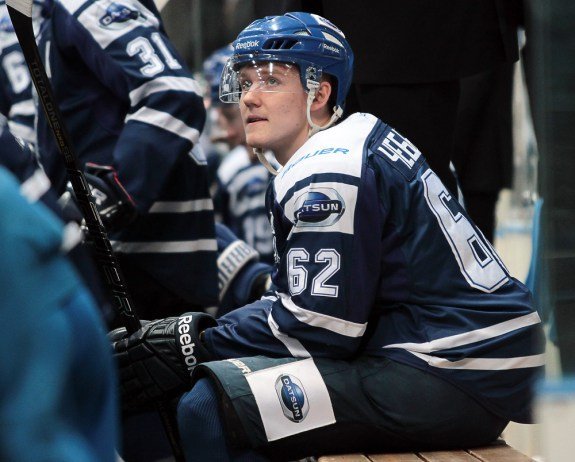
Chebykin and Bobylev attended last year’s rookie camp together in Toronto and came away with glowing reviews about the experience. For the Leafs, bringing their European draft picks over for exposure to the city and the team’s world-class facilities, staff and resources is a worthwhile endeavor that arms the prospect with the tools, relationships and information that can help both the club and the player make the eventual North American transition a reality (such as the example of Pierre Engvall, who made a quick transition into the AHL and helped the Marlies win a Calder Cup this Spring).
“[The camp] was simply great… I liked everything,” reflected Chebykin. “From the hotel rooms to the locker rooms [and the facilities], it was just great. And, of course, I loved the city.”
Chebykin described the on-ice sessions as much different from what he was accustomed to at home. This year, General Manager Kyle Dubas has confirmed that the camp will do away with the scrimmage portion of the camp and focus on skill sessions on the ice as well as the nutrition, training, lifestyle and media training off the ice.
“I would say that everything was different — for example, shooting exercises,” Chebykin noted, while adding that most of the practices were focused on technical aspects of the game with a major focus on skills development.
Like with most Russian players, the language barrier plays a big role in their adaptation to the North American culture, and Chebykin is no exception.
“Now my English is a lot better than it was [last year], but unfortunately it’s still far from being ideal.”
Other Russian-speaking players at the camp last summer included 2017 draft selection Fedor Gordeev and undrafted forward Kirill Kozhevnikov.
“Gordeev and Bobylev helped me really a lot,” said Chebykin. “We spent a lot of time all together, and they were our translators.”
Chebykin added that the coaches and management were pleased that he took part in last year’s camp, and that he was sent back to Russia with the mission of improving in all areas of his game. The Leafs haven’t offered the big Russian forward a contract yet – as a pick out of Europe, they retain his rights until 2020 — but he will skate again at the 2018 development camp in Toronto starting on Monday, June 25.
After that, Chebykin has signed with the Ufa franchise on a two-year contract and is squarely focused on the task at hand. It’s clear that the NHL is a goal in the back of Chebykin’s mind, but he’s got a lot to accomplish in Russia before the dream can become a reality.
“I’m not thinking so far in the future yet,” said Chebykin. “For now, I’m in Ufa, and my goal is to play in the KHL and I will do all my best to play at that level.”
The Leafs’ interest, meanwhile, will depend on whether Chebykin — entering his 21-year-old season in 2018-19 – can make the jump and contribute capably at the KHL level over the next couple of years. As is the case with most seventh-round draft choices, the development path is a marathon, not a sprint.

![Craig Berube on his allegiances when Matthews competes against Canada for gold: “I’m torn a little bit… I’m cheering for our [captain], but I’m Canadian, too” Craig Berube, Toronto Maple Leafs head coach](https://mapleleafshotstove.com/wp-content/uploads/2026/02/berube-prac-feb-21-218x150.jpg)
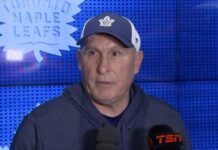







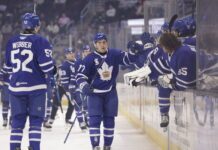

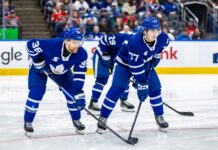

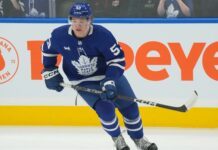
![John Gruden after the Leafs prospects’ 4-1 win over Montreal: “[Vyacheslav Peksa] looked really comfortable in the net… We wouldn’t have won without him” John Gruden, head coach of the Toronto Marlies](https://mapleleafshotstove.com/wp-content/uploads/2025/09/gruden-post-game-sep-14-218x150.jpg)
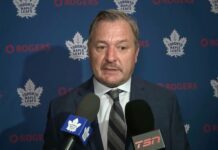
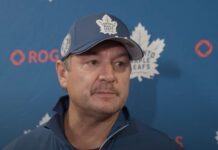

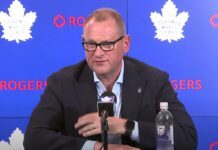
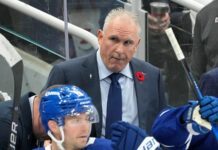
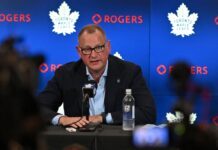
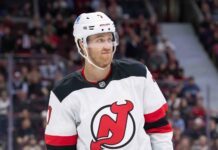
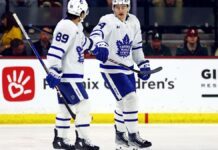
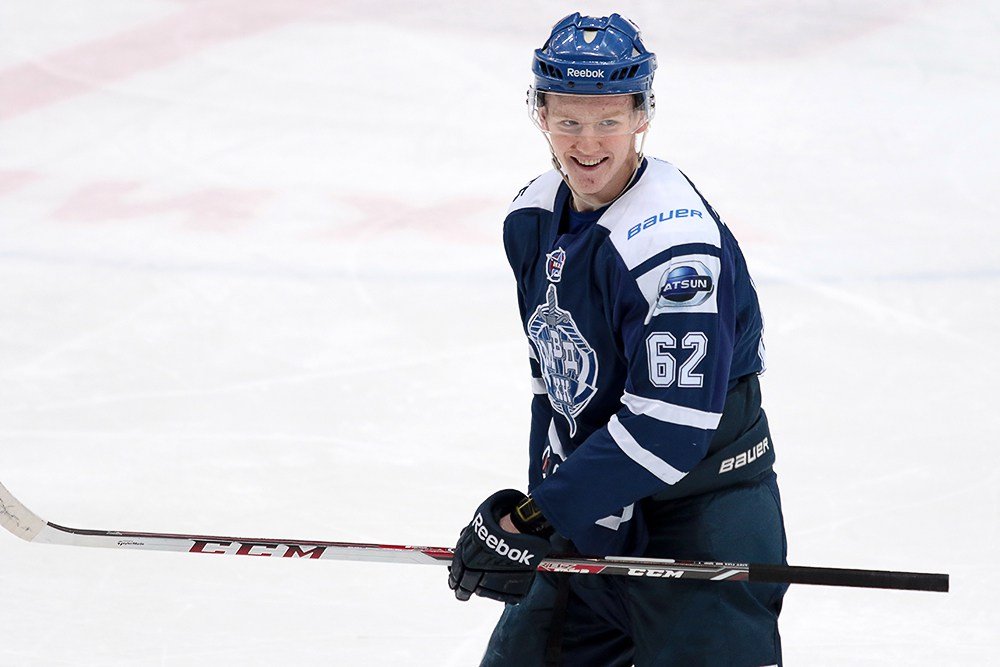




![Craig Berube on his allegiances when Matthews competes against Canada for gold: “I’m torn a little bit… I’m cheering for our [captain], but I’m Canadian, too” Craig Berube, Toronto Maple Leafs head coach](https://mapleleafshotstove.com/wp-content/uploads/2026/02/berube-prac-feb-21-100x70.jpg)




